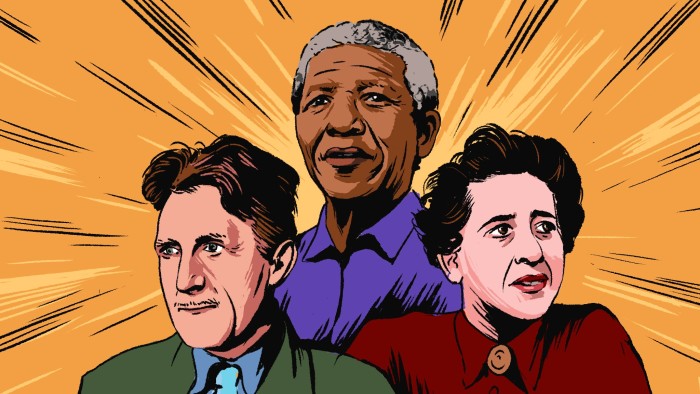Stay informed with free updates
Simply sign up to the Life & Arts myFT Digest — delivered directly to your inbox.
Who are your heroes? Most of us choose them young. First, by about age 12, we pick heroes from sports, music and fiction. These choices matter. “Most people are influenced far more than they would care to admit by novels, serial stories, films and so forth,” wrote George Orwell. Especially influential, he thought, were the books “that are read earliest in life. It is probable that many people who would consider themselves extremely sophisticated . . . are actually carrying through life an imaginative background which they acquired in childhood from (for instance) Sapper and Ian Hay” — or Harry Potter, or Superman.
Then, through about our early twenties, we choose our intellectual and political heroes — for me, as a future journalist, inevitably including Orwell. (The equivalent patron saint of budding libertarians is Ayn Rand.)
Who we are shapes our choice of heroes, but then our heroes shape us. Though they fade from our minds as we age, their influence lasts. I’ve been thinking about this process lately, because I’ll be discussing my heroes this Sunday on a Dutch TV programme, Zomergasten (“Summer Guests”).
Tragically, there are no recordings of Orwell speaking, but Zomergasten has found remarkable videos of Hannah Arendt and Nelson Mandela. The Arendt one is an interview recorded soon after publication of her 1963 book Eichmann in Jerusalem, based on the trial of Nazi war criminal Adolf Eichmann. I read it when I was 21. I now know the critiques: her “banality of evil” line underestimated Eichmann’s fanaticism, and her account of the Holocaust is flawed, possibly antisemitic. But the book showed me how I wanted to write. Arendt, in her cold prose, manages to interweave four strands: reporting, on the trial; history, of the Holocaust; philosophy, from her intellectual training; and, almost entirely concealed, memoir, from her experiences as a refugee from Nazism. I wanted to write in layers like that.
Watching the video, I see something else in Arendt that inspired me: an attitude. The camera is close on her theatrical face, which switches between contempt and amusement as she puffs on a cigarette. She thinks that what upsets people about her book is less its content than its “ironic” tone. She understands their anger: it’s because, she says, “I can still laugh. I really thought Eichmann was a fool. I read this police interrogation, 3,600 pages, very carefully, and I don’t know how many times I laughed, aloud!” It’s a shocking statement, but also an expression of independence: she is herself, she doesn’t belong to any club, and she’ll say what she thinks even if people hate it.
My political hero, chosen at around the same age, is Nelson Mandela. Why is crystallised for me by a video of him as president of South Africa in 1995, visiting the self-anointed white Afrikaner homeland Orania, which wanted autonomy within the newly Black-ruled country. Meeting his political opponents, he is confronting the eternal political problem: how can we all get along?
He is received in Orania by Betsie Verwoerd, 94-year-old widow of Hendrik Verwoerd, the “architect of apartheid”. Greeting her with his movie-star smile, Mandela gently guides her outside to the assembled cameras. In passing he joyously greets a white boy in Afrikaans. Mandela taught himself his oppressor’s language in jail.
At the press conference, he thanks Mrs Verwoerd for “a very pleasant conversation” and for serving him his beloved Afrikaner koeksisters pastry. Eyes twinkling, he jokes with the journalists, lowering the country’s emotional temperature.
But he’s also serious. Asked how he feels visiting Orania, he replies: “We always think that others have horns, before we actually meet them.” He says: “I’m not worried about people stating their point of view. I know what my point of view is.” His ideal is a South Africa “where we cease to think in terms of colour.” He won’t compromise on that. What he’s doing in Orania is showing his opponents ordinary respect.
When Mrs Verwoerd reads out her statement calling for a homeland, she stumbles over the words, and he prompts her in Afrikaans. Then the Afrikaners escort him into the veld to see her husband’s statue. Verwoerd was prime minister when Mandela was jailed in 1962. Now Mandela faces an impossible task: he must show respect to Afrikaners, but not to Verwoerd. Arriving at the statue, he finds the perfect line: “Well, you made him very small!”
Our heroes guide us through life.
Find out about our latest stories first — follow FT Weekend Magazine on X and FT Weekend on Instagram
